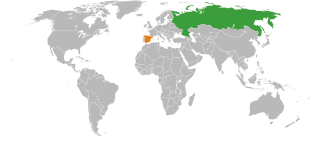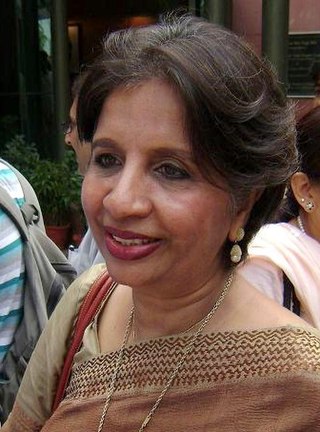
Yuli Mikhailovich Vorontsov was a Soviet and Russian diplomat, President of International Centre of the Roerichs (Moscow). In the mid-1970s he was Chargé d'Affaires at the Soviet embassy in Washington under Ambassador Dobrynin. He was then Ambassador to India (1978-1983) and France (1983-1986). He returned to Moscow to be the first deputy foreign minister (1986-1990) and participated in arms reduction talks with the United States. In 1988-1989, he was simultaneously the Ambassador to Afghanistan as Soviet troops withdrew from the country. He then served as the last Soviet ambassador to United Nations between 1990 and 1991 and as the first Russian Permanent Representative to the UN from 1991 to 1994. After this he served as the Russian ambassador to the United States from 1994 to 1998. In 2000 Vorontsov was chosen as the high-level coordinator for issues related to a paragraph of United Nations Security Council Resolution 1284 which once again required Iraq to face "its obligations regarding the repatriation or return of all Kuwaiti and third country nationals or their remains, [and] the return of all Kuwaiti property [...] seized by Iraq".

John F. Tefft is an American diplomat who has served as a Foreign Service Officer since 1972. He was the United States Ambassador to Russia between July 31, 2014 and September 28, 2017. He had previously served as the United States' ambassador to Ukraine, Georgia, and Lithuania.

Vitaly Ivanovich Churkin was a Russian diplomat. As a child actor, he starred in three films The Blue Notebook, Nol tri, and A Mother's Heart. Churkin served as Russia's Permanent Representative to the United Nations from 2006 until his death in 2017.

Loy Wesley Henderson was a United States Foreign Service Officer and diplomat.

Gideon Meir was an Israeli diplomat. He served as its ambassador to Italy from 2006 until 2012. He was noted for being part of the negotiating team that drafted the Egypt–Israel peace treaty in 1979.
Triloki Nath Kaul was one of India's foremost diplomats in the 20th century. A member of the Indian Civil Service (ICS), he served in the foreign service branch, culminating in his being appointed Foreign Secretary twice. He was ambassador to several countries.

Jacob Dyneley Beam was an American diplomat.
A. H. M. Moniruzzaman is a career diplomat in the Bangladesh Foreign Service. He served as the head of Bangladesh's mission to the European Commission in Brussels and ambassador to Belgium and Luxembourg from September 2006 until December 2008. He was concurrently ambassador to Switzerland.

The Russian Federation and the Kingdom of Spain, a member state of the European Union, have bilateral foreign relations. Spain and the Grand Duchy of Moscow first exchanged envoys in 1520s; regular embassies were established in 1722. The two countries share a long history of relations, characterized at times by close cooperation and at other times by deep hostility. Soviet-Spanish relations, once terminated after the Spanish Civil War, were gradually reestablished starting in 1963 and were fully established by 1977. Trade between the two countries amounted to two billion euros in 2008. In March 2009, the two countries signed an energy agreement providing national energy companies access to other party's domestic markets.

Libya–Russia relations are the bilateral relations between the State of Libya and the Russian Federation. Russia has an embassy in Tripoli, with Libya having an embassy in Moscow. Diplomatic contact between Russia and Libya has generally been close and productive, seeing as both countries have had and continue to see volatile relations with the United States. Former Libyan leader Muammar al-Gaddafi was a close ally of the Soviet Union, despite his country's membership in the Non-Aligned Movement. Russia also regards Libya as one of its strongest allies in the Arab world, and has supported stabilization of the country following the aftermath of the Libyan Civil War. After the outbreak of new conflict, Russia has primarily backed the Tobruk-based House of Representatives over the UN-backed Government of National Accord and various other factions.

The Embassy of Australia in Moscow is the diplomatic mission of Australia to the Russian Federation. The current head of post and Ambassador of Australia to the Russian Federation is Graeme Meehan. The embassy serves as the diplomatic mission for Australia to the Russian Federation, Armenia, Belarus, Kazakhstan, Kyrgyzstan, Tajikistan, Turkmenistan and Uzbekistan. The chancery is located at 10A/2 Podkolokolny Lane in the Tagansky District of Moscow.

Latvia–Russia relations are the bilateral foreign relations between Latvia and Russia. Latvia has an embassy in Moscow. Russia has an embassy in Riga.

Qatar–Russia relations are the bilateral foreign relations between the two countries, Qatar and Russia.

Mauritania–Russia relations are the bilateral foreign relations between the Russian Federation and Mauritania.

Nirupama Menon Rao is a retired civil servant of 1973 batch Indian Foreign Service cadre who served as India's Foreign Secretary from 2009 to 2011, as well as being India's Ambassador to the United States, China and Sri Lanka during her career.
Sergei Vadimovich Kirpichenko was a Russian diplomat. He served as ambassador to various countries during the 1990s until the 2010s, and at the time of his death was the incumbent Ambassador to Egypt.

Allan Phillip Mustard is a retired American agricultural economist and career diplomat who served as the United States Ambassador to Turkmenistan from 2014 to 2019. He was the chair of the OpenStreetMap Foundation (2019-2021), and advises the Caspian Policy Center.














